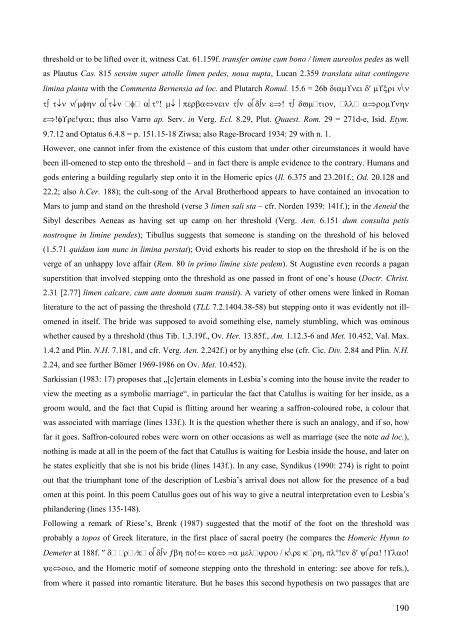CATULLUS 68 - Scuola Normale Superiore
CATULLUS 68 - Scuola Normale Superiore
CATULLUS 68 - Scuola Normale Superiore
Create successful ePaper yourself
Turn your PDF publications into a flip-book with our unique Google optimized e-Paper software.
threshold or to be lifted over it, witness Cat. 61.159f. transfer omine cum bono / limen aureolos pedes as well<br />
as Plautus Cas. 815 sensim super attolle limen pedes, noua nupta, Lucan 2.359 translata uitat contingere<br />
limina planta with the Commenta Bernensia ad loc. and Plutarch Romul. 15.6 = 26b διαμϒνει δ′ μϒξρι ν⎝ν<br />
τ∫ τ↓ν ν⎛μφην α⎡τ↓ν φ α⎢τ°! μ↓ ⎢περβα⇔νειν τ∫ν ο⎡δ∫ν ε⇒! τ∫ δϖμ τιον, λλ α⇒ρομϒνην<br />
ε⇒!φϒρε!ψαι; thus also Varro ap. Serv. in Verg. Ecl. 8.29, Plut. Quaest. Rom. 29 = 271d-e, Isid. Etym.<br />
9.7.12 and Optatus 6.4.8 = p. 151.15-18 Ziwsa; also Rage-Brocard 1934: 29 with n. 1.<br />
However, one cannot infer from the existence of this custom that under other circumstances it would have<br />
been ill-omened to step onto the threshold – and in fact there is ample evidence to the contrary. Humans and<br />
gods entering a building regularly step onto it in the Homeric epics (Il. 6.375 and 23.201f.; Od. 20.128 and<br />
22.2; also h.Cer. 188); the cult-song of the Arval Brotherhood appears to have contained an invocation to<br />
Mars to jump and stand on the threshold (verse 3 limen sali sta – cfr. Norden 1939: 141f.); in the Aeneid the<br />
Sibyl describes Aeneas as having set up camp on her threshold (Verg. Aen. 6.151 dum consulta petis<br />
nostroque in limine pendes); Tibullus suggests that someone is standing on the threshold of his beloved<br />
(1.5.71 quidam iam nunc in limina perstat); Ovid exhorts his reader to stop on the threshold if he is on the<br />
verge of an unhappy love affair (Rem. 80 in primo limine siste pedem). St Augustine even records a pagan<br />
superstition that involved stepping onto the threshold as one passed in front of one’s house (Doctr. Christ.<br />
2.31 [2.77] limen calcare, cum ante domum suam transit). A variety of other omens were linked in Roman<br />
literature to the act of passing the threshold (TLL 7.2.1404.38-58) but stepping onto it was evidently not ill-<br />
omened in itself. The bride was supposed to avoid something else, namely stumbling, which was ominous<br />
whether caused by a threshold (thus Tib. 1.3.19f., Ov. Her. 13.85f., Am. 1.12.3-6 and Met. 10.452, Val. Max.<br />
1.4.2 and Plin. N.H. 7.181, and cfr. Verg. Aen. 2.242f.) or by anything else (cfr. Cic. Div. 2.84 and Plin. N.H.<br />
2.24, and see further Bömer 1969-1986 on Ov. Met. 10.452).<br />
Sarkissian (1983: 17) proposes that „[c]ertain elements in Lesbia’s coming into the house invite the reader to<br />
view the meeting as a symbolic marriage“, in particular the fact that Catullus is waiting for her inside, as a<br />
groom would, and the fact that Cupid is flitting around her wearing a saffron-coloured robe, a colour that<br />
was associated with marriage (lines 133f.). It is the question whether there is such an analogy, and if so, how<br />
far it goes. Saffron-coloured robes were worn on other occasions as well as marriage (see the note ad loc.),<br />
nothing is made at all in the poem of the fact that Catullus is waiting for Lesbia inside the house, and later on<br />
he states explicitly that she is not his bride (lines 143f.). In any case, Syndikus (1990: 274) is right to point<br />
out that the triumphant tone of the description of Lesbia’s arrival does not allow for the presence of a bad<br />
omen at this point. In this poem Catullus goes out of his way to give a neutral interpretation even to Lesbia’s<br />
philandering (lines 135-148).<br />
Following a remark of Riese’s, Brenk (1987) suggested that the motif of the foot on the threshold was<br />
probably a topos of Greek literature, in the first place of sacral poetry (he compares the Homeric Hymn to<br />
Demeter at 188f. ″ δ ρ ⁄π ο⎡δ∫ν ƒβη πο!⇐ κα⇔ =α μελ ψρου / κ⎝ρε κ ρη, πλ°!εν δ′ ψ⎛ρα! !ϒλαο!<br />
ψε⇔οιο, and the Homeric motif of someone stepping onto the threshold in entering: see above for refs.),<br />
from where it passed into romantic literature. But he bases this second hypothesis on two passages that are<br />
190






